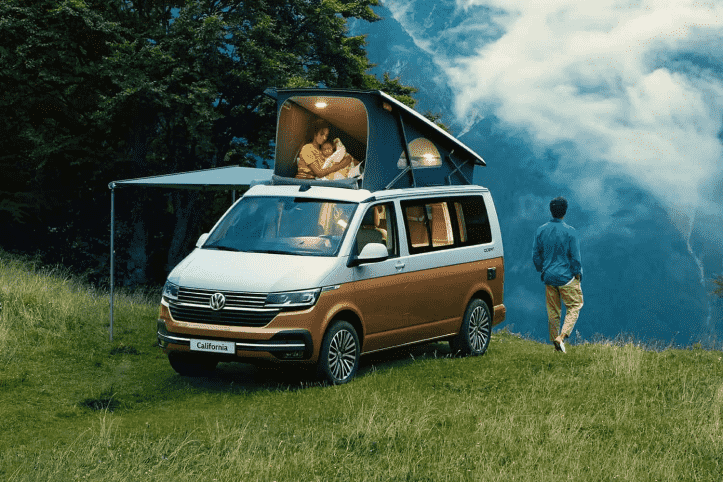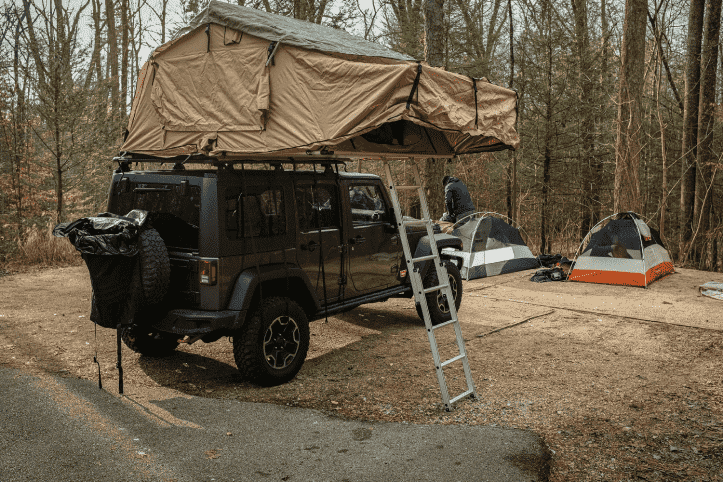
Camping is one of the best ways to spend time with your loved ones, don't you think? It is amazing to be able to enjoy the days in the middle of nature and the nights under the stars. But doing so does not always end up to be an amazing experience, since many things can go wrong on a camping or overlanding trip. For instance, unpleasant weather conditions and bugs can significantly hinder your plans if you are not properly prepared for your trip.
Since we don't want that to happen, we share with you some hacks so that you can grab your tent and sleeping bag and go on a safe yet exciting new adventure this summer. You'll thank us later!
Advantages of Camping at the End of Summer

Summer camping is a fantastic idea but here is why you should consider doing it towards the end of the summer season:
As many people will have already finished their vacations, you will save kilometers of traffic and will be able to travel in peace. Furthermore, in peak summer season, most campsites are usually packed, which is not the case at the end of summer. There will be greater availability and more choices if you decide to go on your camping and overlanding trip once the madness has passed.
There will be fewer crowds at different destinations and you will be able to move more freely. Moreover, you won't find long queues, nor will you have to book months in advance, since camping at the end of summer is synonymous with relaxation and time.
At the end of the season, you no longer have to fight with tourists for parking spaces or tickets. Plus, you save money, since many destinations already start their low season prices at the end of summer.
While in the initial months of summer, it seems that there are only tourists, at the end of the season, normality returns to the different camping destinations and the native population. This way, you can authentically discover the regions and everything that they have to offer.
Tips for Camping in Summer

Whether it's your first time or you're an experienced camper, the following tips will help you avoid small accidents during your camping trip:
A lot depends on the area or the campsite itself. Having overly noisy neighbors, little shade, or a long way to get to the water can be quite annoying in the long run. Take your time and look around to find what best suits your needs. Keep in mind that the sun changes position throughout the day and the trees and bushes can give you more shade. Also remember that it is important to take into account where the bathrooms are to avoid any inconvenience throughout your trip.
Although there are several insect repellent sprays in the market, their components raise concern among campers. Surely, the best way to keep bugs away is to use lavender essential oil because it is absolutely safe for children and babies. However, it must be used well-diluted or mixed. Since every inch of skin surface must be treated, it is best to mix lavender oil into a body lotion.
Forgot your umbrella? Don't want to spend all day indoors? You can easily protect yourself and your companions from the sun using a large cloth, 2 stones and 2 strong sticks. You just have to put the sticks in the ground with a little less distance than the length of the fabric. Tie 2 corners of the fabric to the poles, pull the remaining 2 corners diagonally to the ground and hold them down using a large stone.
Even if you feel like a sip of cold water while lying on the beach, it's best to control your impulses. Our body consumes energy while converting cold drinks into body heat, and that is why you feel hotter than before. So, you might reconsider the desire for a cocktail in the evening. Instead, make 2 liters of hot tea in the morning, put it in a thermos and take it with you to the beach or while hiking in the mountains. Hydration is key when you are out camping.
Many little things can ruin the day if you are not well-prepared for them. Whether it's a blister on your foot, a broken nail, or a hole in your pants. A well-thought out emergency kit has saved many a camping trip. In your emergency bag, you can store everything you might need in case of small emergencies. What to include in it? The important ones are a sewing kit, analgesics, charcoal tablets, a nail clipper, a pocket knife, tape, safety pins, meters of rope, a lighter and sunscreen.
Just because you are in the lap of nature does not mean you have to be disconnected. A portable battery (there are solar ones too) to recharge your phone or tablet is always an excellent companion. In addition, it will help you power other devices, such as a headlamp. Choose one that has at least 10,000 milliamps of capacity.
In many places, temperatures can drop at sunset, getting quite chilly by dawn. Therefore, bring some warm clothing and blankets for the night, especially if you want to enjoy the experience of sleeping while watching the stars.
Another key point to combat high temperatures in your campervan trip is to properly ventilate the vehicle. Keep in mind that air currents will always be beneficial to control the temperature of the cabin of the campervan or overland expedition vehicle. Open windows and skylights when the outside temperature is lower than the inside. This will create a ventilation system that will reduce the thermal sensation. In case of intense heat, open the windows and skylights that are not exposed to the sun.
If you are a regular user of recreational vehicles, you can skip this point. Otherwise, it is worth remembering that all camping vehicles require completely different driving than a car, no matter how large it may be. Above all, you need a period of adaptation to the specific overland vehicle you own. This is mainly because they are larger and heavier and, among many other things, they generate much greater inertia than a car and so, take a longer distance to stop. Adaptation is even more necessary if a caravan is towed, especially in situations of side wind as it could be difficult to maneuver it in twisty urban environments.
With an overland vehicle, you neither drive nor travel as fast as you do with a car. Also, you cannot park and spend the night anywhere you like. If that's your idea, chances are that you'll come back from your vacation with a fine in your pocket. So, as important as the final destination (a campsite area could be ideal) is, the journey is also a vital consideration. So, it is advisable to know the areas where you could take breaks and potential campervan parkings that you will find along your route.
Although there are people who use their campers very often, there are others who only use them for big vacations, which means restarting a vehicle that has not been on the road for a long time. In addition to taking care of the cleanliness of the interior and exterior, it is not a bad idea to check the tyre pressure, carry out a small mechanical check, check the stabilizers (if equipped), take a look at the sealing of the doors and windows, clean and disinfect the fresh water tank as well as inspect faucets and gas connections.
Although moving like this may seem like an adventure or something fun, especially at first, it is true that if you travel with children, you have to be especially proactive. Bringing story books, painting equipment or a tablet on board so that they can watch their favorite cartoons can be a good idea. Because if not, the trip (and stay) can prove to be very long. The same thing is true for pets. If you travel with a dog, for example, don't skimp on stops as it gives them a chance to stretch their legs.
Last but not least, we must emphasize that it is essential (as well as mandatory) that everyone travels in their properly secured seat. Likewise, it doesn't hurt to watch how you place your luggage, so that it doesn't move during the journey. Another aspect that is sometimes overlooked is that if you are going to carry something placed outside the vehicle, it must be correctly secured and marked. For example, a bicycle must be on its bike rack and the V-20 sign must be clearly visible.
Most Important Questions and Answers for Summer Camping
How to Camp in the Heat?
Camping in the heat can be challenging but not impossible. To enjoy the experience to the fullest, it is important to choose a cool, shaded area to pitch your tent and avoid direct sunlight. In addition, it is important to wear light clothing and reflective materials to avoid heat and radiation. Some useful things to bring are a portable umbrella, a fan, a water bottle, and a cooler to store fresh food and drinks.
How to Camp Comfortably?
Camping comfortably requires good planning. Choose a suitable place, carry the necessary equipment to protect yourself from the weather, choose an adequate tent, prepare nutritious meals and carry enough water to stay hydrated. Finally, select a clean place far from civilization to enjoy nature.
What to Keep in Mind When Camping?
When camping, it is important to choose a safe place that is away from any threats to your safety, such as running water, nearby roads, and wild animals. Protect yourself from the weather by carrying appropriate camping equipment such as tents, sleeping bags, and temperature-appropriate clothing. It is also essential to carry water, food, medicine and survival items such as a flashlight, knife and a lighter.
What is Necessary to Camp on the Beach?
You need basic camping equipment, including a tent, a sleeping bag, a pillow, cooking utensils, tarps, a campfire, camp lights, drinking water, non-perishable food, comfortable clothing, a flashlight, first aid, towels, an umbrella and a beach towel.
Conclusion
It cannot be disputed that camping is a great way to spend some much-needed downtime in the lap of nature. That said, you must make sure that you put in a sufficient amount of prep work before embarking on a journey. This holds especially true if you are thinking of camping and overlanding in the summer with your family. Although it might seem daunting at first, all you need is some preparation and planning to have a great time. Also, make sure that the place you camp in is left spotless when you leave. Leaving no trace of your presence at a campsite is an unspoken yet important rule that all campers should adhere to.
In any case, if you follow the tips and hacks mentioned above, you are bound to have a great time camping and overlanding this summer. If you are looking for good overlanding vehicles to get you sorted for the next trip this summer, feel free to get in touch with us at Expedition Meister!
Comments